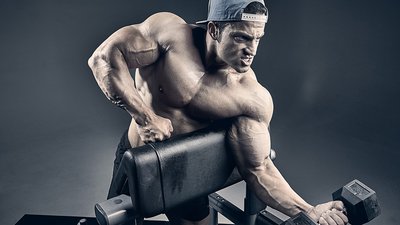In 1979, Arash Rahbar was an infant in revolutionary Iran. After 2,500 years of Persian monarchy, the increasingly-corrupt, yet Western-friendly government was overthrown by Islamic interests wishing for a return to fundamentalism. In the capital streets, armed guerillas overtook the ruling powers and replaced them with their own. Westerners were taken hostage, the Shah of Iran was exiled, and Ayatollah Khomeini, revolutionary, became Supreme Leader.
Arash Rahbar's family fled under the subsequent stress and uncertainty, emigrating to the United States. They came with nothing, and, from the ground up, built and settled into lives. This is who Arash Rahbar is—a guy whose family, just one generation ago, spoke no English and had no jobs or money, but survived on grit.
"A lot of people that have it tough end up failing," he tells me. "But I think it pushes you and it forces you to work harder, and it breeds a lot of successful men."
He speaks with a ground-level inflection, like a voice you might hear in an alley, at a bus stop, or one booth over in a diner. Rahbar sounds like everybody, a guy you run into down the block, a guy you talk to. He does not sound like the 2016 Mr. Olympia Classic Physique runner-up, although he is.
Reflecting on his roots again, he says: "If you are pushed into a swimming pool and you don't know how to swim, you're still gonna paddle. You're still gonna move, kick your hands and feet trying to survive. When you come here with a family, with kids, the way my father came, you have no choice. It's either hustle or be homeless."
Playing Frank Zane
Maybe it's this grit that landed Rahbar a role in the upcoming movie, "Bigger," about Joe and Ben Weider, the brothers who created the Mr. Olympia contest, co-founded the International Federation of Bodybuilders (IFBB), built a fitness-magazine empire, and more or less commercialized the world of bodybuilding as we know it today.
In "Bigger," Rahbar plays blue-collar, Pittsburgh native Frank Zane, a three-time Mr. Olympia, who reigned from 1977 to 1979, the year Rahbar's family arrived in the United States. Rahbar's current physique is a dead ringer for Zane's iconic 1970s aesthetic.
Maybe, at the end of the day, Rahbar gets what he gets because he's named after "Arash the Archer" in Persian mythology.
"Arash was what Hercules was to the Greeks," he tells me, recounting a story in which the landmass of Iran was determined by how far the mythological Arash could shoot his arrow: over 3,000 miles it turned out, definitely what we'd call a Herculean feat. "He put all his might, all his energy into it, and he gave his life."
And for all of Rahbar's life, he's been laser-focused on similar warrior mythologies and grandiose figures. As a kid, he was an outlier who felt alienated, but found bodybuilding and contact sports at the age of 13, studying Schwarzenegger, Hulk Hogan, Stallone, and Bruce Lee, masters of the body game but also of the mind.
"I felt stronger, more powerful, and I felt like a warrior," he says, adding that he suddenly had the attention and respect of his peers.
By 16 years old, with no mentors other than his heroes and no instruction of any kind, he was training six days a week and eating up to six meals a day. He did this for almost 20 years, with no intention of competing. It wasn't until 2014 that Rahbar, in his 30s, chose to compete. He turned pro that same year.
To outsiders, Rahbar appeared to have come out of nowhere. To Rahbar, he had always been a part of their world. While friends had moved on to college or other things, Rahbar's life had remained in the gym, where he felt most comfortable. Only now, he was letting people see him in a brighter light. While he may be runner-up to Mr. Olympia in his division, he still sees himself as the same guy who spent a couple of decades with a hoodie over his head, sweating it out in anonymity.
Hard Work and Patience Pay Off
"People say, 'What motivates you?'" Rahbar tells me. He pauses, then adds, "Nothing." He believes that the word "motivation" has been watered down and commercialized by overuse.
"I just want to do this shit," he says. "Everyone is trying to be motivational, but what they don't realize is you don't set out to be a saint, you don't set out to be an angel, you don't set out to be a motivational speaker. Do what you do daily, what feels right to you and you love, and if people find that motivational, great! If not, it's OK. But just because you have an Instagram account and you own a tank top and a shaker doesn't mean you're a motivational speaker."
Not surprisingly, Rahbar's no-nonsense approach to life is manifested in his workouts. His training philosophy, he says, is "balls to the wall, high intensity, blunt force trauma."
"Unfortunately," he adds, "that comes with a lot of dangers."
Like most bodybuilders, Rahbar suffers from minor but recurring aches and pains, so his routine has to be flexible. Mostly, he goes by feel. Some weeks, he lifts heavy with less volume, while other weeks he bangs out pyramids. He often switches up his grip and technique, experimenting with different styles, but he's a classicist at heart.
"There are no secrets," he tells me. "If you want to become a brain surgeon, here are the steps. If you want to become an attorney, here are the steps. If you want to become a bodybuilder, here are the steps. They include putting in hard work and having patience."
Put Your Hood On
Rahbar tells me that, in the 1970s, the era he inhabits in "Bigger," there were no fancy machines and no gimmicks—and nobody expected a miracle, either.
"Back in Arnold's heyday, if you hadn't been weightlifting in your dad's garage since you were 12, you weren't a bodybuilder," he says. "That's just the way it was. What's happening now is that guys are trying to speed up the process for quick gains, and that doesn't work. You won't look good, it won't be quality mass, and you'll probably end up hurting yourself, either externally or internally."
Rahbar's own gains are made by spending long hours in the gym, but he also supplements with creatine, glutamine, amino acids, and protein, all by Dymatize, the company that sponsors him but whose products, he says, he'd been taking for years before the company approached him.
Nutritionally, he eats clean, powering through chicken, white fish, and steaks, with carb sources of white rice, sweet potatoes, creamed rice, and oatmeal.
"You won't catch me doing insanely high-calorie days like a lot of people on Instagram," he says. "I don't agree with that approach."
When I ask him if social media has any influence on his training habits, either through self-reflection or comparison addiction, Rahbar's voice spikes animatedly.
"Absolutely not," he says, adding that he loves his fans and the support they offer him, but that he's turned off by the images of everyday life filtered to look better than they are. He tells me that he sometimes develops relationships with people online, and everybody is tanned and ripped and happy all the time—the perfect avatars for their brand—but only on the surface; when he meets them in person, they're nothing like their online persona.
"Social media is not real. It's too much of this pretty bullshit." he says. "That definitely puts a lot of stress on these younger guys I see in the gym—everyone's wearing a stringer, even in the dead of winter. I wore a hoodie for 18 years. I didn't wear a stringer until I was a pro bodybuilder reaching 4 percent body fat. You just need to put your hood on, listen to your music, and train hard."
Arash Rahbar Is No Avatar
It's hard for me, a kid from Detroit, to have anything but admiration for Arash Rahbar. He feels like he's from my neighborhood—not the worst place to be, but not the best place, either. He seems like he remembers things that changed him, long before he was a rising star, even if those things are only in the collective memory of his family.
Mostly, I don't feel like I'm talking to one of those idealized social media avatars when I'm talking to Arash, and I tell him as much. I say, "It's nice to run into a guy who's on the rise but remembers where he's from." When I tell him this, I get the answer I'd expect.
"That means more to me than 'you have nice biceps'," he says. "What I do is not easy. There's a lot of passion, there's a lot of pain…It's very deep for me. But, I pose onstage in my underwear. That's what I do, at the end of the day. And there's starving children out there all over the world."

